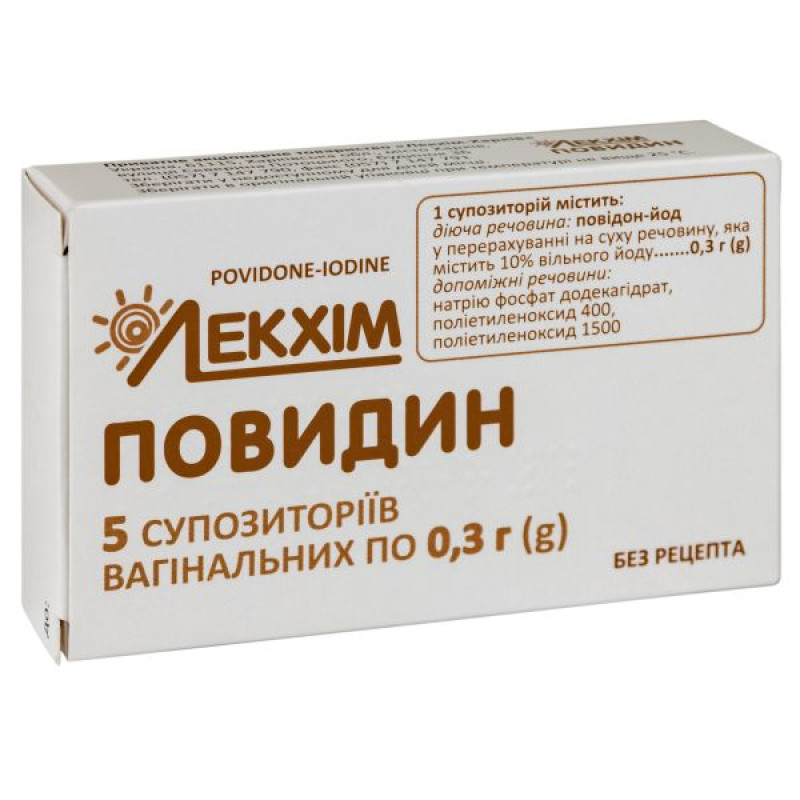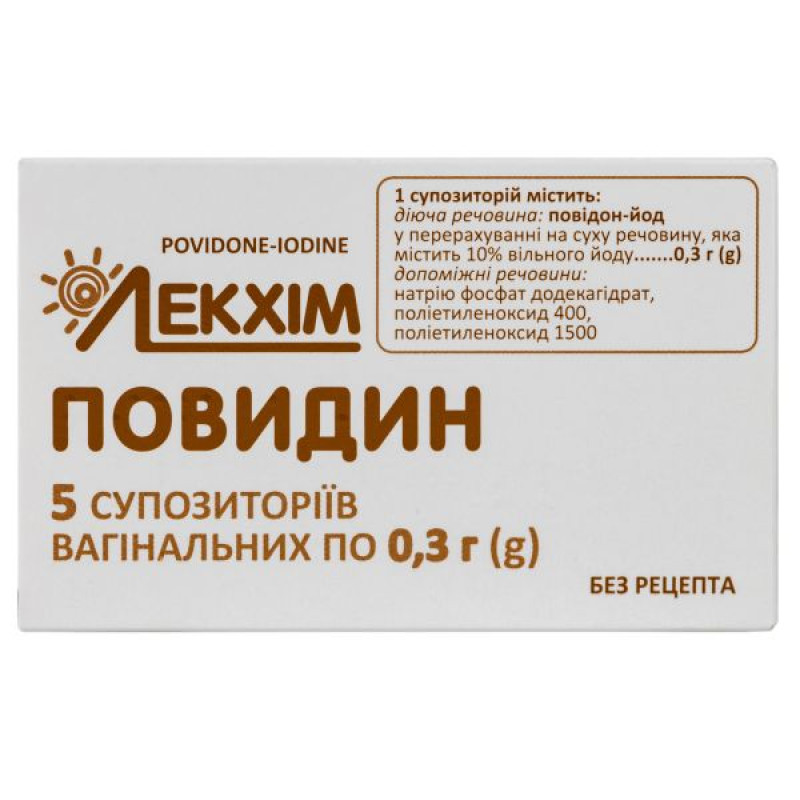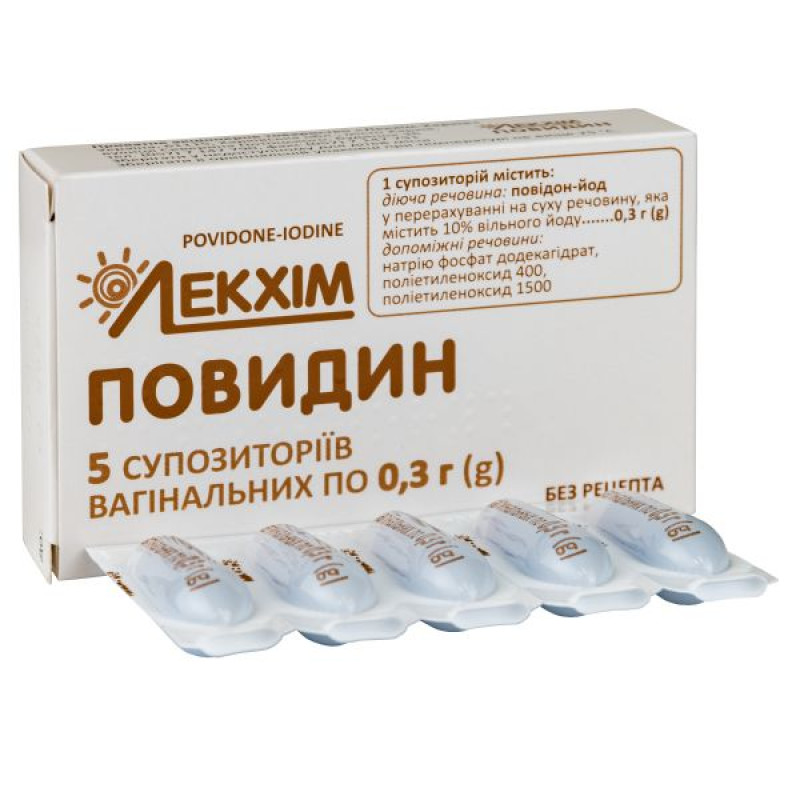Povidin vaginal suppositories 0.3 g blister No. 5

Pharmacological properties
Povidone suppositories have an antiseptic (bactericidal, fungicidal, virucidal) effect, including microflora with polyresistance to chemotherapeutic drugs. The drug has an anti-inflammatory effect due to the hyperosmolar properties of the hydrophilic base. Povidone-iodine is a water-soluble complex compound of iodine with a synthetic non-toxic polymer polyvinylpyrrolidone. Upon contact with the skin or mucous membrane, ionized iodine is released from the complex, which has a pronounced antiseptic effect due to its high oxidizing ability. Due to this, povidone-iodine has a pronounced bactericidal, fungicidal, sporicidal, selective antiviral effect, active against protozoa.
With topical application, there is almost no development of iodine from the mucous membrane.
Indication
Treatment of acute and chronic vaginitis and colpitis caused by mixed infection, trichomonas colpitis and fungal infection of the vagina.
Application
Enter vaginally 1 suppository per day before bedtime for 14 days. Before insertion, the suppository must be moistened with water. If necessary, depending on the infection, suppositories can be used 2 times a day and throughout the menstrual cycle, including the days of menstruation.
Contraindication
Individual hypersensitivity to iodine, dermatitis herpetiformis of Duhring; thyroid adenoma; hyperthyroidism, renal failure. It is not recommended to prescribe the drug to children, as well as during pregnancy and breastfeeding. The period before and after radioactive iodine therapy.
Side effects
There may be discomfort in the groin area, itching, which occurs rarely and is temporary.
Painful sensitivity, skin hypersensitivity reactions in the form of skin rash, urticaria, itching, hyperemia may develop. In some cases, generalized hypersensitivity reactions with a drop in blood pressure and/or shortness of breath, angioedema, anaphylactic shock (anaphylactic reactions) are possible.
If signs of local intolerance reactions (irritation and sensitivity) appear, the use of the drug should be discontinued.
Cases of hypo- and hyperthyroidism have been described. Extensive and prolonged topical use of povidone-iodine can sometimes cause neutropenia.
The drug may have a spermicidal effect and should not be used when fertilization is desired.
Special instructions
In non-manifest hyperthyroidism and other diseases of the thyroid gland, especially in elderly patients, it is used under constant medical supervision. Activity decreases in an acidic environment. During treatment, it is recommended to use sanitary pads to avoid contamination of underwear.
Continuous or prolonged use of povidone-iodine should be avoided in patients receiving lithium, hepatic insufficiency, or thyroid disease. The use of povidone-iodine may reduce iodine uptake by the thyroid gland and affect the results of some studies (thyroid scintigraphy, determination of protein-binding iodine, diagnostic procedures using radioactive iodine). When planning these procedures, a break of at least 1-4 weeks should be allowed in the use of PVP-Iodine.
The oxidizing effect of Povidone-Iodine can cause corrosion of metals, while plastic and synthetic materials are generally not sensitive to Povidone-Iodine. In some cases, discoloration of plastic and synthetic materials may occur, which is usually reversible.
PVI is easily removed from textiles and other materials with warm soapy water. Stains that are removed should be treated with ammonia solution or sodium thiosulfate.
Use during pregnancy or breastfeeding. The drug should not be prescribed during pregnancy and breastfeeding.
The ability to influence the reaction rate when driving vehicles or working with other mechanisms. No data.
Children. The drug is not prescribed to children.
Interactions
The drug cannot be used simultaneously with radioactive iodine, disinfectants containing chlorhexidine, silver sulfadiazine, mercury and alkali, due to possible partial deactivation.
Concomitant use of the drug with lithium may cause a synergistic hypothyroid effect.
Overdose
Increased adverse reactions, allergic reactions. It is recommended to reduce the frequency of use or completely discontinue the drug.
Acute iodine intoxication is characterized by the following symptoms: metallic taste in the mouth, increased salivation, heartburn, pain in the mouth or throat; irritation and swelling of the eyes; skin reactions; gastrointestinal disorders; impaired renal function, anuria; circulatory failure; laryngeal edema with secondary asphyxia, pulmonary edema, metabolic acidosis, hypernatremia, metabolic disorders.
Treatment: supportive and symptomatic therapy is carried out with monitoring of electrolyte balance, kidney function and thyroid gland.
In case of overdose, toxic plasma iodine concentrations can be effectively reduced by peritoneal dialysis or hemodialysis.
If signs of iodine-induced hyperthyroidism appear, appropriate treatment is recommended.
Storage conditions
At a temperature not exceeding 25°C.
There are no reviews for this product.
There are no reviews for this product, be the first to leave your review.
No questions about this product, be the first and ask your question.








